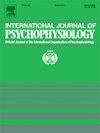When social comparison works as a demotivator: Stronger peers mitigate effort levels
IF 2.5
3区 心理学
Q3 NEUROSCIENCES
引用次数: 0
Abstract
The present study tested the effect of social comparison on effort-related cardiovascular responses. Specifically, we investigated how effort levels are influenced when individuals compare themselves to significantly better peers versus similar or slightly better peers. 43 participants played five-minute video games while displaying the scores of peers who were similar, slightly better, or significantly better, in addition to a control condition without peer scores. Effort-related cardiovascular responses were measured using the pre-ejection period during both game and baseline conditions. Results revealed that the pre-ejection period was stronger when participants competed with peers who were similar or slightly better compared to those who were significantly better or in the control condition. These findings highlight the role of social comparison in modulating effort-related cardiovascular responses, emphasizing the moderating role of the ability gap between the individual and the comparison source on the effect of social comparison on effort.
当社会比较作为一种消极因素时:更强的同伴会降低努力程度。
本研究测试了社会比较对努力相关心血管反应的影响。具体来说,我们调查了当个体将自己与明显更好的同伴相比,与相似或稍微更好的同伴相比,努力水平是如何受到影响的。43名参与者玩了五分钟的视频游戏,同时显示同伴的得分,这些同伴的得分相似,稍好,或明显更好,此外还有一个没有同伴得分的控制条件。在游戏和基线条件下,使用弹射前的时间测量与努力相关的心血管反应。结果显示,当参与者与那些明显更好或处于控制条件下的同龄人竞争时,他们的前弹射期更强。这些发现强调了社会比较在调节努力相关心血管反应中的作用,强调了个体与比较源之间的能力差距对社会比较对努力的影响的调节作用。
本文章由计算机程序翻译,如有差异,请以英文原文为准。
求助全文
约1分钟内获得全文
求助全文
来源期刊
CiteScore
5.40
自引率
10.00%
发文量
177
审稿时长
3-8 weeks
期刊介绍:
The International Journal of Psychophysiology is the official journal of the International Organization of Psychophysiology, and provides a respected forum for the publication of high quality original contributions on all aspects of psychophysiology. The journal is interdisciplinary and aims to integrate the neurosciences and behavioral sciences. Empirical, theoretical, and review articles are encouraged in the following areas:
• Cerebral psychophysiology: including functional brain mapping and neuroimaging with Event-Related Potentials (ERPs), Positron Emission Tomography (PET), Functional Magnetic Resonance Imaging (fMRI) and Electroencephalographic studies.
• Autonomic functions: including bilateral electrodermal activity, pupillometry and blood volume changes.
• Cardiovascular Psychophysiology:including studies of blood pressure, cardiac functioning and respiration.
• Somatic psychophysiology: including muscle activity, eye movements and eye blinks.

 求助内容:
求助内容: 应助结果提醒方式:
应助结果提醒方式:


